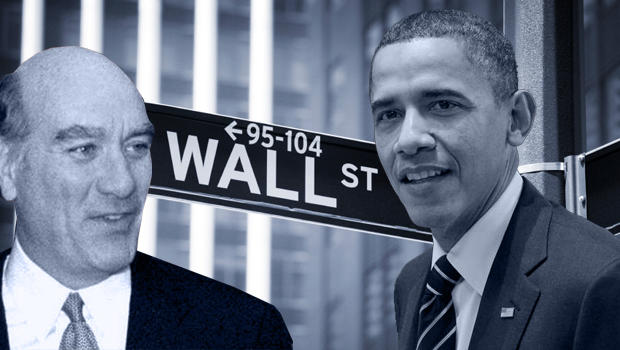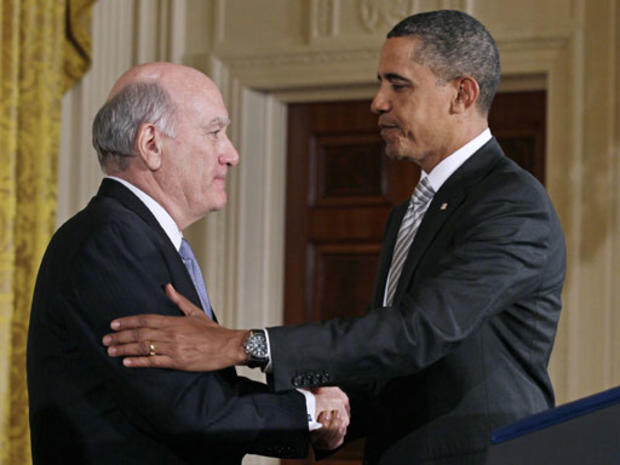William Daley: Does Obama's Pick Foster a White House/Wall Street "Unholy Alliance?"
You know something strange is going on when the U.S. Chamber of Commerce offers kind words for the Obama administration.
But that's just what happened on Thursday, not long after news broke that Mr. Obama had selected JP Morgan Chase executive (and former Clinton administration commerce secretary) William Daley to be his new chief of staff. Daley replaces Chicago mayoral hopeful Rahm Emanuel, who left in October, and Peter Rouse, who has served in the interim.
"This is a strong appointment," Chamber President and CEO Thomas J. Donohue said. "Bill Daley is a man of stature and extraordinary experience in government, business, trade negotiations, and global affairs."
Despite the perception in some circles that Mr. Obama has a poor relationship with the business community - his memorable 2009 comments on "60 Minutes" that he "did not run for office to be helping out a bunch of fat cat bankers on Wall Street" seems to have particularly stung - many on the left (and some on the Tea Party right) have long seen the White House as far too accommodating of business interests.
Bringing in Daley to work closely with President Obama has only exacerbated that perception.
"With Wall Street reporting record profits while middle class Americans continue to struggle in a deep recession, the announcement that William Daley, who has close ties to the Big Banks and Big Business, will now lead the White House staff is troubling and sends the wrong message to the American people," said Justin Ruben, Executive Director of MoveOn.org.
What has liberals so upset? It's hard to know where to start. There's the years at JPMorgan Chase and on the board of mortgage giant Fannie Mae; the fact that Daley reportedly opposed the establishment of the Consumer Financial Protection Bureau that was a major component of financial regulatory reform; Daley's December 2009 argument that Democrats should "steer a more moderate course on the key issues of the day, from health care to the economy to the environment to Afghanistan"; his reported work with the Chamber of Commerce to "loosen the post-Enron regulations on the accounting and auditing professions"; his work in the Clinton administration to get the North American Free Trade Agreement through Congress; and, more generally, the fact that he's seen as a strong advocate to the Obama administration for the interests of big business.
Before the selection, Politico asked banking officials and corporate lobbyists who they wanted in the chief of staff job, and the "unequivocal" response was Daley. The subsequent story included just the sort of quote to make a liberal (as well, potentially, as a Tea Partier) cringe: "Immediately things would get better" if Daley got the job, one executive said. "You can pick up the phone and call him in a way you can't really with anyone there now."
Not long after the pick was formally announced, Senate Republican Leader Mitch McConnell offered similar praise.
"This is the guy who's actually been out in the private sector been part of business," he said. "Frankly, my first reaction is that sounds like a good idea."
For those on the other side, meanwhile, the news out of the White House may be about to get worse: On Friday, Mr. Obama is expected to name Gene Sperling to replace Larry Summers as head of the National Economic Council. Sperling held the job in the Clinton administration, and he currently serves as a Treasury adviser. But he has also made hundreds of thousands of dollars in recent years as a consultant to Goldman Sachs, perhaps the most-loathed of Wall Street banks. (It should be noted that Sperling's work for Goldman involved the far-from-evil task of "managing a charitable program to teach skills to poor women in Africa and elsewhere.")
The best argument for Daley among those who think Wall Street has too much influence in the White House is this: The chief of staff job is about politics, not policy. You need someone who can make the case for the administration's policies - and who better than someone that the business community already trusts?
And Daley does have has backers among the liberal establishment, among them former presidential candidate Howard Dean. He also chaired Al Gore's 2000 presidential campaign, which took a populist - not pro-big business - tone in his run at the White House.
Daley's presence in the White House may also mean that the business community ends up spreading the wealth instead of aggressive backing Republicans in the 2012 campaign cycle - an important consideration at a time when corporate money is flowing into political campaigns more freely than ever.
But for those who chafe at the influence of corporate money in Washington, that's not necessarily something to celebrate. Republicans have already zeroed in on Daley's ties to JP Morgan and Fannie Mae to paint him as an enabler of a corporate-welfare culture in Washington - one exemplified by the TARP bailout from which JP Morgan benefited.
Indeed, this is an area where both the left and the right can find some common ground. As Charles Gasparino wrote in his book Bought and Paid For: The Unholy Alliance Between Barack Obama and Wall Street, "the list of benefits the Street has received from Obama are amazing: guarantees of limits of firms' debt; active participation of the government in the bond markets, propping up the prices of debt still held on the firms' books; and of course, the continuation of 'too big to fail.'"
"When you strip away the name-calling and class warfare coming from the Obama administration, and when you ignore Wall Street's gripes about the new financial reform legislation that will put a crimp in some of its profits, these two entities are far more aligned than meets the casual eye," he writes. "They coexist to help each other -- in an unholy alliance against the American taxpayer."


